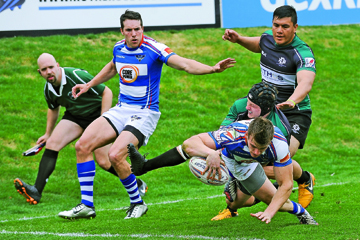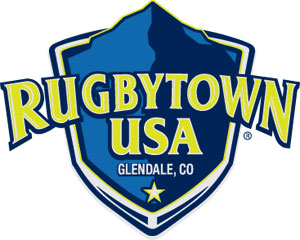May 17 At Infinity Park
by Scott Krieger|
Writer for and on behalf of the City of Glendale
On Saturday May 17 at 3 p.m. the Glendale Raptors will battle it out in all likelihood against strong rival San Francisco Golden Gate Rugby Club (SFGG) for the championship of the newly formed Pacific Rugby Premiership (PRP). The new league is composed of seven top clubs in Denver and the West Coast and is considered to have a lot of the top rugby teams in the nation. But the disbandment of the rugby Super League and then the Elite Cup has resulted in there being no national championship this year containing all the top teams in the country. It is hoped that an Atlantic Rugby Premiership can be formed so all the top teams will vie for a national title next year, but there are no assurances that the same will occur.
Pacific Rugby Premiership (PRP). The new league is composed of seven top clubs in Denver and the West Coast and is considered to have a lot of the top rugby teams in the nation. But the disbandment of the rugby Super League and then the Elite Cup has resulted in there being no national championship this year containing all the top teams in the country. It is hoped that an Atlantic Rugby Premiership can be formed so all the top teams will vie for a national title next year, but there are no assurances that the same will occur.
In the meantime the Raptor-SFGG match is creating great anticipation. Glendale is on top of the PRP standing with only one loss but that loss was to SFGG out in San Francisco by the score of 31-26 in a seesaw match. A second regularly scheduled match between the clubs is set for for May 3, in Glendale ending the 14 week regular season of the PRP.
The PRP is set up to be a pipeline for the USA Eagles. In years past in the Super League, the level of competition varied to the point that many matches were decided by a large point margin. The PRP, more selective with its members, has reduced that component of the game and funneled both a great amount of talent and pointed coaching into each match, every week.
The premiership is still in the early stages of its existence, and plans to keep growing. It is already looking to integrate a new member, Park City Haggis, next season.
“The PRP has definitely proven to be the highest level of competition,” Glendale captain and seven-time Team USA member Zach Fenoglio said. “Hopefully the PRP has learned from the things that made the Super League great and will only lead to more success and higher competition for years to come.”
The seven clubs that make up the league already have a rich history in the development of the sport in the western United States, and ideally the PRP will only further that and continue the growth of the game.
Olympic Club traces its incredible roots back over 100 years to its founding in 1908. That year, they competed against teams from Stanford, California, and the University of Pacific. Not long after, they began an international search for more demanding competition. In 1913 they played a vaunted New Zealand club, and although they took the loss, it was much more of a match than even the USA National team put up against the All Blacks. In the 1960s, when most western rugby teams were just being formed, O-Club was reaching their peak of dominance, both domestically and overseas. The club has continued both touring and attracting new talent for the last 30 years. This season has fallen short of expectations, as the team is in seventh place with a record of 2-7.
Old Mission Beach Athletic Club (OMBAC) began playing rugby in 1954, initially only to satisfy the desire for organized competition. In 1966, team members were granted a petition to be sponsored in San Diego, and set off down the road of competitive play. Later in the 1960s, San Diego State graduates flocked to the club, instilling a new level of talent and athleticism. OMBAC was the first team to win both the 15s and 7s National Championships, and have done so many times over. The club took the full-side championships in 1988, ’89, ’91, ’93, ’94 and ’96, and continue to compete with the highest level of rugby clubs in the country. OMBAC is 4-3-1 and in fifth place in the standings.
Known around Southern California as Belmont Shore Rugby Club, the club was originally formed in 1964 as the Long Beach Rugby Club. Original founders were comprised mostly of Long Beach State football players as well as members of the United States Coast Guard. The team first started thriving in the ’80s, evolving then to be known as Belmont Shore. It was around this time they began to attract international talent and truly grew into a powerhouse. Belmont won its first National Championship in 1998, beating New York Old Blue. They used this as a springboard as they entered a decade of dominance, which has continued into their inception into the PRP. Shore is in third place in the PRP this year with a record of 5-4.
Founded a few short years after Belmont, the Denver Barbarians came to be in 1967. The first major post-collegiate rugby club in the region, the Barbos were initially formed by a collection of ex-college ruggers as well as lacrosse players in search of new competition. The club really did serve as pioneers for professional rugby in the region, as by the spring of 1968 three more teams had formed with more on the way. Denver won the National Championship in 1990 and has been competing at high levels both in 15s and 7s ever since. The Barbarians have fallen to fourth place this season after two recent losses to Glendale.
The early 1970s witnessed the birth of yet another powerhouse rugby club. Santa Monica Rugby Club was established in 1972 by graduates and rugby players of surrounding schools like UCLA and USC. The team found success almost immediately, traveling to a number of National Championships over the years, and taking home the title in both 2005 and 2006. Currently, they occupy sixth place in the league.
1988 brought forth the birth of San Francisco Golden Gate after the merger of two Division II teams, Barbary Coast and the Castaways. Throughout the ’90s, the team was a staple in the Final Four, but never captured the National Title. Over the years, though, SFGG has pumped out numerous players to both the USA Eagles as well as international squads. They have enjoyed sustained success so far this season, and sit in second place in the PRP with a record of 7-2.
Glendale comes in as the new kids on the block. Established in 2007, the Raptors have accomplished much in a short amount of time, serving as a benchmark for the sport and playing in RugbyTown USA. Winning the National Championship in 2011, the Raptors immediately made a name for themselves, and haven’t looked back since. Led by Head Coach Andre Snyman, the club sits atop the PRP standings with a record of 8-1.
Three games remain before the finals at Infinity Park. The Raptors have vastly outperformed expectations thus far this season, displaying premier rugby week after week in their chase for a title. They will travel to California to play the next two matches, before returning home for the final week’s match on May 3. “I want to keep the players focused and mentally sound by not burning them out with information overload but instead remaining cool, calm, and collected,” Snyman said.
On a current six-game win streak, the Raptors hope to ride their success through the next three weeks and give the city of Glendale a hometown team to cheer for in the finals at Infinity Park.

